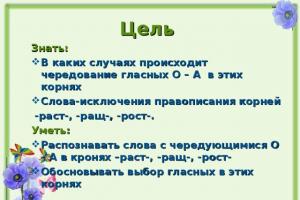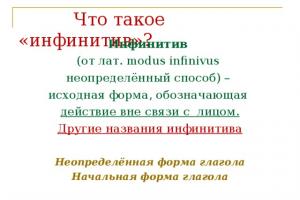In a sentence, the indefinite form of the verb can act as the main and minor members, which makes it similar to a noun, which also has the ability to be used in the meaning of any member of the sentence:
Come over my brother was scared(M. Gorky) . I ready to tell to you, field, about wavy rye under the moon(S. Yesenin) . Yes, and you will go on your way to scatter the joyless days(S. Yesenin) . He was sent to her with instructions to convey a sign(A. Pushkin) . Mother, in tears, ordered me to take care of my health, and Savelich to look after the child.(A. Pushkin) .
In the role of predicate infinitive most often appears in the following syntactic constructions:
1) one-part impersonal and infinitive sentences: Best to see him in the morning(A. Griboyedov);
2) in two-part sentences as part of a compound verbal predicate (the first part of such a predicate is always expressed by a phase or modal verb): Say goodbye I wanted to be with you as a friend(M. Lermontov). Vronsky and Anna continued to sit at the small table(L. Tolstoy);
3) in two-part sentences as a simple verbal predicate in a situation where it is likened to forms of the indicative mood and receives a temporary meaning with a nominal subject: Are you bribing me?(M. Saltykov-Shchedrin) - bribe “you bribe.” Here I am screaming and water is pouring into my mouth(M. Sholokhov) – scream"screamed"; He beats you, and you stand your ground(V. Sleptsov) - beat"will hit."
Subject function can perform an independent infinitive with a predicate, expressed by a noun, predicative adverb, another infinitive, less often - an adjective in the full form of the instrumental case with a copula: Follow behind the thoughts of a great man there is a most interesting science(A. Pushkin). Live on earth, even without being in love, is a glorious occupation(A. Chekhov). Live in old mansions with great-grandmother’s furniture, it’s cute, but uncomfortable(A. Tolstoy). « Live- this is to know! - Lisa repeated(M. Gorky). Stay in Bogucharovo was becoming dangerous (L. Tolstoy).
In the role of adverbial purpose, the infinitive appears when it refers to verbs of motion ( walk, run, jump, move, drive and etc.): You came here to listen to my confession, thank you(M. Lermontov). One neighbor sometimes comes over to play cards(A. Pushkin). Tired of spending the night, the fighters went from all the dens to warm themselves by running, washing themselves with snow, snow as hard as sand(A. Tvardovsky).
Infinitive, often used as an inconsistent definition, explains an abstract noun with the modal meaning of necessity, possibility, obligation, desirability, expression of will, etc. and denotes the characteristic according to its internal content: Given the possibility of losing her forever, Faith became dearer to me than anything in the world.(M. Lermontov). He gave strict orders not to let her out of the room and to see that no one spoke to her.(A. Pushkin). I have an innate passion to contradict(M. Lermontov).
Sometimes the infinitive of verbs is an object. The infinitive object denotes the action as an object to which the action of another person is directed (asked to stay, invited to sit): I'll have Andrey and his violin moved into your room.(A. Chekhov). Please excuse me from further questions.(K. Paustovsky). Dasha forced Ivan Ilyich to drink several cups of coffee(A. Tolstoy).
Less often, the infinitive performs the function of a complement when it denotes an action performed jointly by a person playing the role of a subject (subject) and another person ( agreed to meet, were planning to go, agreed to write): On this day, in the morning we agreed to go to the skating rink(V. Kataev).
Syntactic role of the infinitive
State Educational Institution "Gymnasium No. 2 of Minsk"
Bulygina L.N.

What is an "infinitive"?
Infinitive
(from Latin modus infinivus
unspecified method) –
original form denoting
action without connection with a person.
Other names for the infinitive
Infinitive
Verb initial form

Goals and objectives
- Summarize information about the syntactic functions of the infinitive in a sentence.
- To develop the ability to differentiate the infinitive as a subject, predicate, object, definition, adverbial purpose.
- Take notes on new material in order to apply it in practice.

Infinitive as subject Repetition
- 1 Copy the sentences, add punctuation marks.
- Emphasize grammatical basics.
- Under what condition is the infinitive the subject of a sentence?

A dash is placed
1. NOUN --- NOUN
Tsarskoye Selo Palace architectural
a miracle of its time.
2. INFINITIVE --- INFINITIVE
Learn to sharpen your mind.
3. NUMERAL --- NUMERAL
Thirty and two hundred fifty six two hundred
eighty six.

A dash is placed
4. NOUN --- INFINITIVE
Favorite pastime of lyceum students is ice skating
along the lake.
5. INFINITIVE --- NOUN
Living “for the common good” is the alumni covenant

A dash is placed
6. NUMERAL --- NOUN
Thirty-two years of existence
Lyceum in Tsarskoe Selo.
7. NOUN --- NUMERAL
The training period for lyceum students is six years.

A dash is placed
8. NOUN
NUMERAL,
INFINITIVE
NOUN,
NUMERAL,
INFINITIVE
Educating a young man at the Lyceum means
give him extensive knowledge
and raise him well.

The presence of an infinitive...
- containing the lexical meaning of the predicate, is the most important identifying feature of a compound verbal predicate

COMPOSITE
VERB
PREDICATE
AUXILIARY
VERB
INFINITIVE
grammatical
meaning
lexical
meaning
He started writing composition .

Compound verb Compound noun predicate predicate
- Minsk is the capital of the Republic of Belarus
- Minsk is the capital of the Republic of Belarus.
- The autumn weather was rainy.
- The task is difficult.
- The days have become shorter.
- Summer turned out to be rainy
- The sky seems gloomy.
- linking verb + nominal part
- (noun, adjective, pronoun, numeral, adverb )
- I love reading historical books.
- I continue to study at the gymnasium.
- I want to go to college.
- I can only study excellently.
- I'm ready to learn
- I need to study
- auxiliary verb, short adjective, adverb + infinitive
Basic auxiliary verbs and short adjectives, predicative adverbs as auxiliary verbs
1. Beginning, end, continuation of action
(phase
Verbs )
2. Possibility, necessity of action (modal verbs)
3.Desirability
actions.
Verbs with the meaning of desire)
1)start
2) be able
4.Emotional assessment of the action.
Verbs with the meaning of thought processes, mental experiences
become
finish
get started
continue
stop
quit
get started
stay
4) love
hate
be able to
learn
be on time
work hard
I started studying
Short adjectives as auxiliary verbs
Predicative adverbs in
roles of auxiliary verbs
Verb-nominal
descriptive
turnover
3)want
like
hope
be afraid to be ashamed
prepare
hurry
tolerate
Glad Nado
must need
obliged perhaps
intends necessary
free is impossible
you can't be powerful
inclined easily
I agree it's difficult
a lot of fun
ready sad
worthy
want
dream
try
try
I like studying
I have to study
I can't help but study
to have a wish
make an effort
agree
make a decision
tion
I can't help but study
I have a desire to learn

Distinguish the infinitive
part of the predicate addition circumstance goals
The action of the same action of another on verbs faces faces movement
compared with an auxiliary verb

Infinitive as part of a compound verbal predicate
- It's sad for us to listen to the autumn blizzard.
- The young man wanted to sort out his problems.
Action by the same person

Infinitive as subject
- To destroy an enemy is a great merit, but to save a friend is the highest honor.
- Reading poetry expressively is a great art.
One of the main members of the sentence is expressed by a noun in the nominative case, and the other by an indefinite form of the verb

Infinitive as an object
what?
- Forests teach people to understand beauty.
- The captain ordered the crew to abandon ship.
Action of another person

Infinitive as a goal adverbial
for what purpose?
- We went to defend freedom, to save light from darkness.
- I came to the south to work on a book.
- I came to the south for work over the book.
With verbs of motion
in some cases such an infinitive
can be replaced with a noun
for what purpose?

Infinitive as a definition
which?
- More than once an irresistible desire arose in her soul to express everything without concealment.
- The travelers still made an effort to move forward.
which?

Let's sum it up results lesson

Introspection
- Now I can…
- I was surprised...
- It was difficult…

Homework
- Theory
- Exercise
The infinitive can be any part of the sentence: 1) subject (if the infinitive at the beginning of the sentence is smoke– harm health; ride- funny); 2) predicate: a) simple verbal predicate in a non-productive form (if it is procedural); b) as part of a compound verbal predicate (subjective character); c) as part of a compound nominal predicate (its attachment to the infinitive subject - smoke - harm health (it is)); 3) addition (objective character - I I beg I believe sing); 4) the circumstance of the goal (its relation to verbs with the meaning of movement - I went study in the Institute); 5) inconsistent definition (its attribution to a noun, usually verbal - wish study instilled me my Mother)
Impersonal offer
One part is included in the sentence of the conjugated verb class. In this case, the main member is expressed by the conjugated verb form. Its other part is included in the unconjugated verb class, represented by the adverbial variety. In this case, the main member is expressed by a predicative adverb, i.e. state category word.
The meaning of impersonal sentences
Either they do not have components denoting a person at all, or the person or subject is thought of as passive, i.e. unable to control an action or state.
Form of the third person, singular, present or future tense in the indicative mood or neuter, singular, past tense in the indicative mood (Dawn. Svetalo). The subject is absent or the subject is conceived as passive
In a two-part sentence, the person is active. This means that the meaning of, for example, a sentence like “I’m not sleeping” is determined as follows: I don’t want to sleep and therefore I don’t sleep. In an impersonal sentence face passive . This means that the meaning of a sentence like “I can’t sleep” is defined as: I should fall asleep, but I not free force yourself to do it.
The passive person is usually represented by forms of indirect cases: dative subject, accusative subject. "He (S) is chilling"
The two common meanings can be divided into a number of particular varieties: 1) impersonal sentences characterizing the state of nature; 2) characterizing spontaneous, unknown forces (there was a hum in the pipes); 3) characterizing a person’s condition (I can’t sleep); 4) denoting modal-volitional relations between phenomena (you can’t go any further)
The main member of impersonal sentences can be expressed: 1) an impersonal verb (impersonal is a verb that is a frozen form, amononymous to the conjugated form of the verb 3 l., singular, present or weekday - It’s getting evening. It’s getting dark). 2) a personal verb in an impersonal meaning; 3) a state category word (Hot). 4) a short passive participle with the suffixes -n-, -en-, -t-, neuter, singular (the room is smoky); 5) impersonal predicative word - no ( No not a cloud)
Morphological analysis of the verb
Parsing order
I. Part of speech. General meaning. Initial form (infinitive).
II. Morphological characteristics.
Permanent characteristics: a) type; b) transitivity; c) repayment; d) conjugation.
Non-constant features: a) mood (indicative, imperative, subjunctive); b) time (if any); c) number; d) face (if any); e) gender (if any).
III. Syntactic role.
Verb initial form
Remember: infinitive May be any member of the proposal .
However, determining the syntactic function of the infinitive is often difficult.
In order not to make a mistake in determining the syntactic function of the infinitive, it is necessary to carefully study the theoretical material on this issue.
Infinitive as the main members of a sentence
v Independent infinitive standing at the first place in a sentence and intonationally separated from the predicate, is subject to . He names the action, the characteristics of which are contained in the predicate. Moreover, as a rule, it contains a definable concept about which some kind of judgment is made:
Live - means to work.
Play Hockey is his main hobby.
Create happiness is hard work.
All exaggerate was his passion.
v The infinitive subject can also occupy post position, if the second main term at the beginning of the sentence has explicit evaluative value:
The worst thing about our work is stay in its growth.
His business was patronize younger and take care about elders.
Wasted work - fish without hook and study without a book.
v The presence of one of the main members of the connective THIS indicates that we have a predicate, and infinitive - subject :
This is against our law - commemorate old.
This is the most accessible way to elevate yourself in your eyes - another humiliate .
What happiness is this - respect parents.
v Sometimes, when defining the main terms, the word order is decisive:
Become a sailor - his dream . His dream – become a sailor .
v The subject infinitive, like the predicate infinitive, can include words dependent on it if one verb does not convey the meaning of the statement. This is often found in proverbs and aphorisms:
To steal from a thief - only time to waste .
teach a fool – what to treat the dead .
play a song – it's not a field to yell .
Nothing to do – hard work .
House to lead – don't shake your beard .
Talk about what has been decided - only confuse .
To drink a tea – don't chop wood .
v Difficulty may arise when the infinitive is combined with words in – ABOUT .
Remember:
if the infinitive is at the first place in a sentence, and next comes the word on – ABOUT , in front of us two-part offer with subject - infinitive :
Argue with him useless .
Tell jokes with liberalism dangerous .
Infinitive reversal in second place after the word on - ABOUT , which is a category of state, turns the sentence into the impersonal :
It's no use arguing with him.
It wasn't easy to get there before work that day due to a snowstorm.
It's dangerous to joke with liberalism.
The presence of the category of state in the infinitive of words necessary, necessary, necessary, impossible, possible, etc. says that this is the predicate of impersonal sentences (regardless of word order):
You have here you can get lost .
Ask about it it was impossible .
Need to find another solution.
v Independent infinitive can act as predicate in so-called one-piece infinitives sentences (a type of impersonal constructions):
Not in sight better luck to you!
Raise sail!
Everyone get ready ! Be silent ! Raise no objection commander!
Who be in love ? Who should believe ?
Such constructions are most often of an order nature and are distinguished by the categorical nature of the statement.
v The infinitive is most often used in a compound verb predicate, which has two parts : auxiliary And main. First conveys the grammatical meaning of mood, tense, person, number or gender, second (infinitive) – the main lexical meaning.
An auxiliary verb can have phasic value (start, continuation, end of action ( started getting ready, started arguing, continued talking, stopped nagging ) and is used with the infinitive only imperfect form:
At my sister's began to stick together eyes.
Welcoming host started me treat .
Other meanings – modal: possibilities/impossibility of action ( didn't dare admit it ), ought ( forced to endure, must go ), expressions of will (desirability, determination, readiness) – changed my mind about buying ; subjective-emotional nature ( loved to eat ); assessment of the degree of normality of an action ( used to commanding ).
If there are two verbs (conjugated and infinitive), both are part of the verbal predicate, If actions relate to one person - the subject of the action:
Ranks are given by people, but People may be deceived . (Griboyedov)
If actions are performed different faces, then infinitive is not part of a compound verbal predicate, but acts as a minor member:
Brother asked Pavku come through thick and thin. (N. Ostrovsky)
Strictly b banned I'm a shot at these gentlemen drive up to the capitals. (Griboyedov)
Infinitives as secondary members of a sentence
Ø The infinitive can perform the function inconsistent definitions . In this case he explains nouns with modal meaning possibilities, necessity, desirability, expression of will, etc. :
× noun which? × noun which?
solution refuse fear make a mistake
× noun which? × noun which?
necessity meet wish help .
Less commonly, the infinitive defines abstract nouns with a different meaning: manner argue, pleasure go hunting, thought go, refusal submit and etc.:
× noun
Only hope ( which?) save her son supported her.
× noun
He was driven by desire ( which?) to figure out the truth.
× noun
Grushenka made him promise ( which?) come behind her at twelve o'clock.
Suddenly an opportunity arose which?) quickly leave from this city.
Ø The infinitive is addition , if the conjugated verb has a full lexical meaning, and the actions of the verbs relate to different persons :
I ask you ( about what?) speak on the merits of the matter.
My father taught me ( what?) walk on a boat with a pole.
The king deigned to order ( What?) we take you to him call . (P. Ershov)
In these examples the action verbs are to different people (I beg I , A will speak companion ; learned father , A will go on a boat son ; ordered tsar , A they came to call him subjects ).
ü Cases are much less common when an infinitive object denotes an action the same subject:
Yesterday we agreed ( about what?) go to the dacha.
In a week he learned ( what?) ride on skates.
My sister quickly got used to it ( for what?) care for a sick mother.
Ø The infinitive can also be circumstance of purpose . At the same time he joins only to the verb . Mainly verbs have the ability to carry an infinitive adverbial clause. movement in space ( lay down relax , sat down read , walked walk , ran catching up). If the infinitive refers to a verb of movement, then the subject of the action called the infinitive and the subject of the action called the supporting verb are required match :
Summer and autumn we're traveling for Kama ( for what purpose?) gather mushrooms.
Travelers settled down by the stream ( for what purpose?) rest And feed horses.
Syntactic role of the infinitive
| Sentence member | Examples |
| Subject | Repeat Yes learn - sharpen the mind. Amazing and enjoyable activity lie on your back in the forest and look up. Laugh healthy. |
| Predicate(or part of the predicate) | To you not in sight such battles! Argue I've never been with him could not . Lisa decided definitely her accompany . Hurry with answer No need . |
| Addition | Having crossed himself, He important sat down and the prisoner let down ordered. General Muravyov ordered fire . |
| Inconsistent definition | He had a treasured dream – move over to the capital. |
| Circumstance goals | To Pavlysh school drive study from different countries. |
To be continued…
Related information.
That smoke is harmful. Smoking is harmful.
Then obey the laws is everyone's duty.
It is everyone's responsibility to obey the laws.
To save money now is practically impossible.
Saving (putting aside) money is now almost impossible.
I shall go to the Crimea. I will go to Crimea.
I didn't see the new production of our drama theatre.
I have not seen the new production of our drama theater.
3. Part of a compound verbal predicate.
Not can dance twist.
He knows how to dance the twist.
b) in combination with verbs that, without an infinitive, do not give the full semantic meaning: to begin - start off, to continue - continue, to decide - decide, to want - want, to hope - hope, to try - try, try, to end - finish, to stop - stay and etc.:
He decided to rest in Sochi. He decided to vacation in Sochi.
She hoped to get tickets for the concert. She was hoping to get tickets to the concert.
4. The nominal part of a compound predicate.
Our plan is to work during our summer vacation and then buy a tape player and some cassettes.
Our plan is to work during the summer holidays and then buy a tape recorder and some cassettes.
I have no desire to order these books.
I have no desire to order these books.
The captain was the last to leave the ship.
The captain was the last to leave the ship. (The captain was the last to leave the ship.)
Please note:
I. The infinitive, which modifies a noun, is translated by a qualifying subordinate clause with a verb expressing obligation in the form of the future tense.
The schoolchildren to take part in the ski race, have come.
The schoolchildren who will take part in the ski competitions have arrived.
The text-book to be published next year is written by our lecturers.
The textbook, which will be published next year, was written by our teachers.
2. The infinitive in the function of definition is often used after the words the first, the second, the third,..., the last, the only, etc. and is translated by a verb in the personal form in the tense in which the predicate verb appears.
Not always the last to come to work.
He always comes to work last.
I am sure she will be the first to come to the railway station to meet us.
I'm sure she will be the first to come to the station to meet us.
1. To express the purpose (when translating, the conjunction is used before the infinitive so that, in order to):
Didn't come to Moscow to study at the University.
He came to Moscow (to) study at the university.
He worked hard not to lag behind the other people.
He worked hard to keep up with others.
BUT: After the verbs to go and to come in the imperative mood, the infinitive is not used. The infinitive takes on the imperative form (imperative form), and both verbs are joined by the conjunction and.
Go and ask him. (You cannot say: Go to ask him.) Go and ask him.
Come and ring him up. (You cannot say: Come to ring him up.) Come and call him.
An infinitive expressing a goal can be preceded by conjunctions in order to - to, so as to - in order to.
Doesn't work so hard in order not to lag behind the other people.
He works so hard (to) keep up with others.
Take a taxi so as not to miss the train.
Take a taxi so you don't miss the train.
2. To express a consequence in circulation








